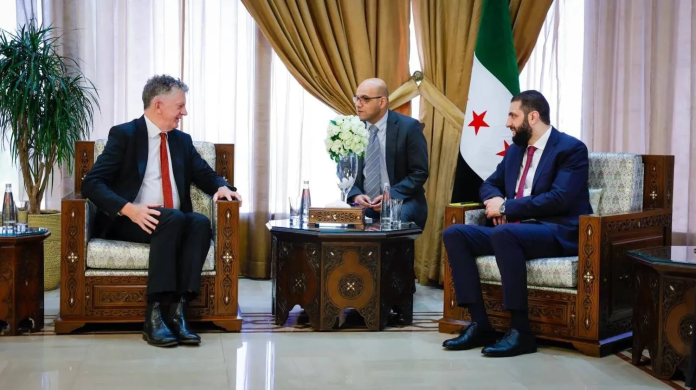Syrian President Ahmed al-Sharaa hosted UK National Security Adviser Jonathan Powell for high-level discussions on bilateral cooperation and regional stability, signalling continued diplomatic realignment.
The closed-door meeting in Damascus, attended by Foreign Minister Asaad al-Shaibani and General Intelligence Director Hussein al-Salama, focused on security coordination and economic reconstruction amid Syria’s fragile transition.
Al-Sharaa emphasised Syria’s conditional openness to international engagement, stating the nation would support “any genuine initiative that supports the region’s security and stability, provided it respects Syria’s sovereignty and independent national decision-making.”
The talks extended undisclosed deliberations from last month’s landmark visit by UK Foreign Secretary David Lammy, the first by a British foreign minister in 14 years since diplomatic relations were cut.
The dialogue accelerates a diplomatic thaw formalised on 5 July, when the UK Foreign Office announced full restoration of relations after a 14-year hiatus. This follows Britain’s April decision to lift sanctions against 12 Syrian entities, including the Defence and Interior Ministries, aiming to “support the Syrian people in rebuilding their country” following Bashar al-Assad’s ouster.
The former leader fled to Russia in December 2024 after Hay’at Tahrir al-Sham (HTS)-led forces toppled his government, ending 54 years of Baath Party rule.
Powell’s unpublished itinerary underscores London’s cautious approach. While no joint statement followed the talks, the presence of Syria’s intelligence chief suggests discussions addressed counterterrorism coordination and border security, critical concerns given residual Islamic State activity and regional drug trafficking.
Meanwhile, the transitional administration, formed in January under al-Sharaa, a former jihadist commander who renounced al-Qaeda ties in 2016, faces criticism over concentrated executive powers and limited minority representation.
The UK conditioned sustained support on “greater protection for minorities and accountability for human rights abuses” under Assad, whereas the US mandates anti-terrorism commitments and progress on Israeli relations.
